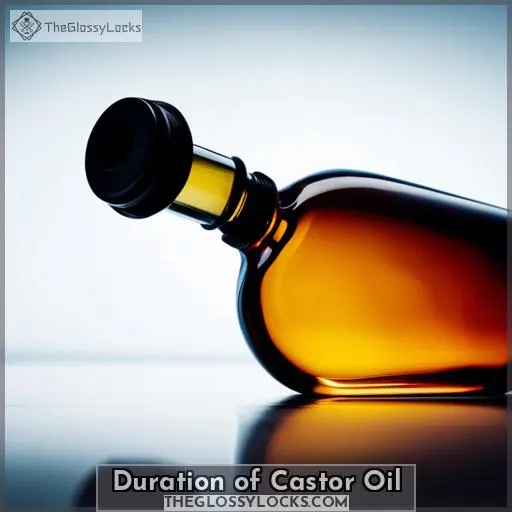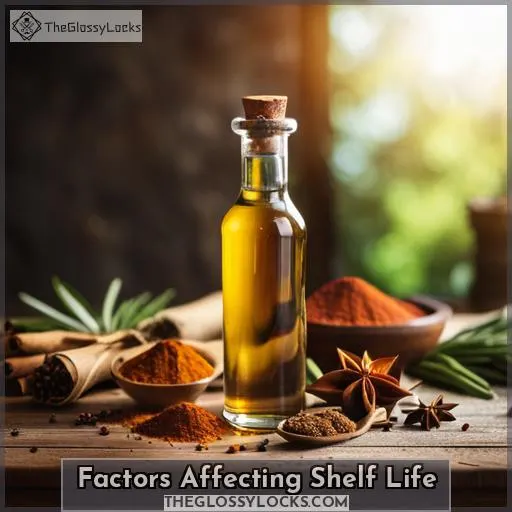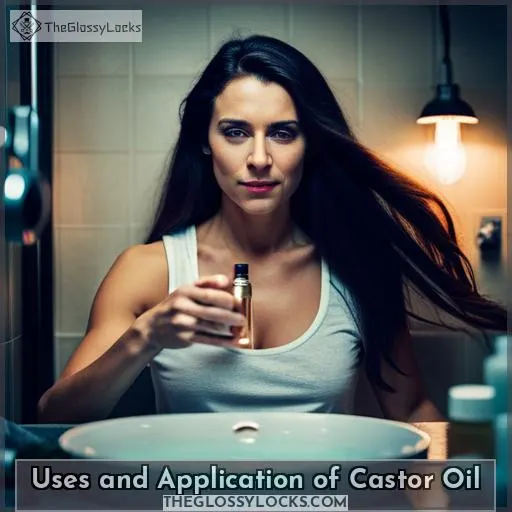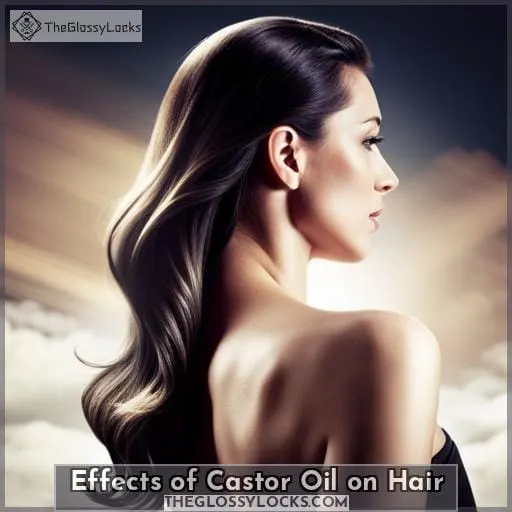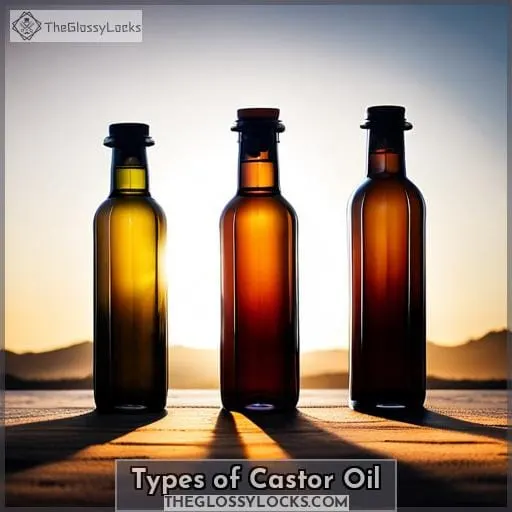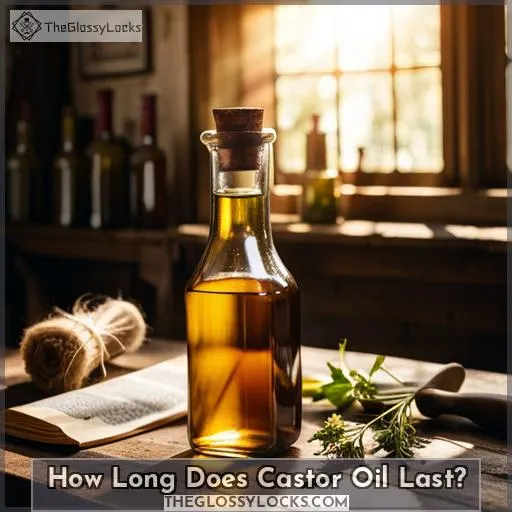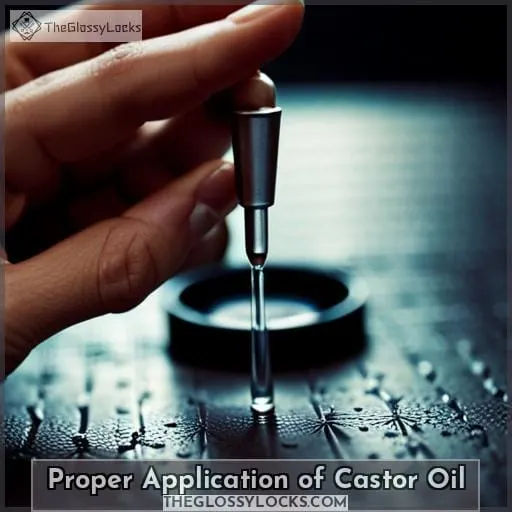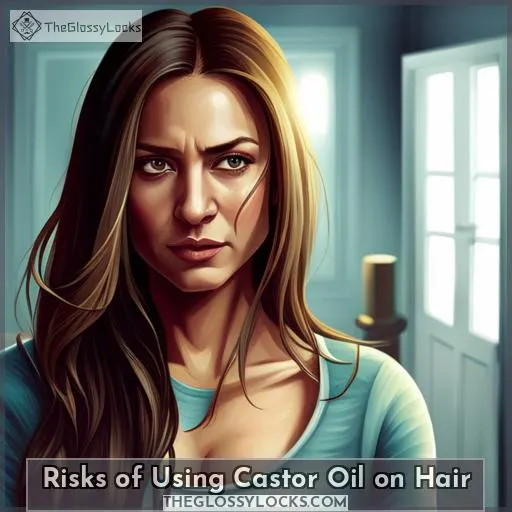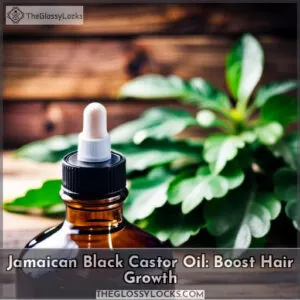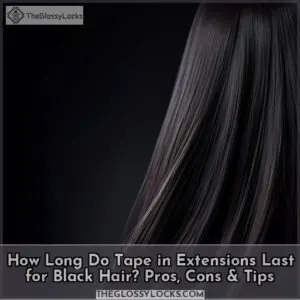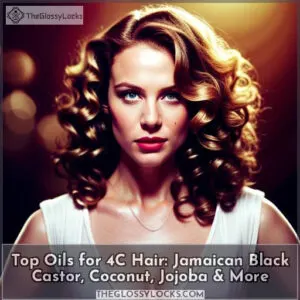This site is supported by our readers. We may earn a commission, at no cost to you, if you purchase through links.
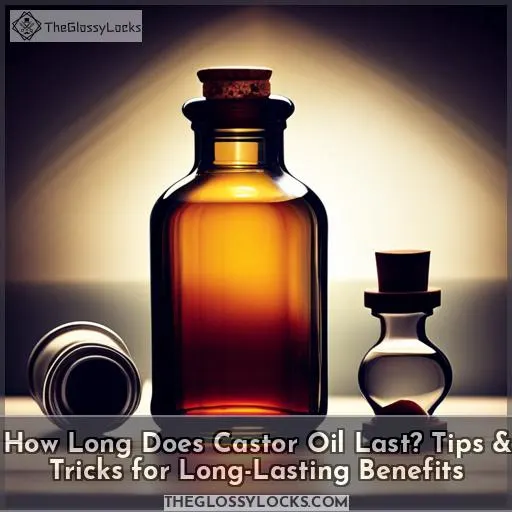 Discovering the secrets of castor oil can be an exciting journey. Many people have found that its benefits last longer than expected, but how long does castor oil actually last?
Discovering the secrets of castor oil can be an exciting journey. Many people have found that its benefits last longer than expected, but how long does castor oil actually last?
To help you unlock the wonders of this powerful natural remedy, we’ve compiled some tips and tricks to ensure your castor oil lasts as long as possible. We’ll cover how packaging and storage conditions affect shelf life, uses for hair growth and conditioning treatments, and effects on hair health such as moisturizing power and adding shine.
We’ll even discuss types of oils available so you can find one that fits your needs perfectly – all while avoiding expired or rancid products with proper cautionary measures like patch tests!
So get ready to learn more about just how long does castor oil really last!
Table Of Contents
- Key Takeaways
- Duration of Castor Oil
- Factors Affecting Shelf Life
- Uses and Application of Castor Oil
- Effects of Castor Oil on Hair
- Types of Castor Oil
- Cautions and Precautions
- How Long Does Castor Oil Last?
- Proper Application of Castor Oil
- Risks of Using Castor Oil on Hair
- Expert Opinions on Castor Oil
- Frequently Asked Questions (FAQs)
- Conclusion
Key Takeaways
- Lasts up to 1 year when stored properly at room temperature, tightly sealed, away from moisture and sunlight.
- Cold-pressed oils retain more nutrients compared to roasted oils, making them the best option for fine hair.
- Jamaican black castor oil is better suited for coarse hair.
- Use small amounts heated over hot water and dilute with carrier oils before applying to the scalp or hair ends.
Duration of Castor Oil
Experience the benefits of castor oil for up to a year or longer with proper storage and use! Castor oil is typically used as an all-natural hair treatment, but its effects on improving hair follicles have made it popular in beauty circles.
When stored at room temperature, sealed properly, and away from moisture and sunlight, you can expect your castor oil product to last around 1 year before needing replacement.
To get maximum benefit out of this miracle worker, apply a small amount using either your fingertips or a brow brush directly onto the scalp after shampooing with warm water. Work through the ends of dry strands until fully saturated, then leave it on for 2 hours before rinsing thoroughly with cool water.
The results? Shiny locks that are deeply conditioned without build-up over time, thanks to regular clarifying treatments every month.
So go ahead, experience liberation from unruly tresses while enjoying long-lasting satisfaction when using pure cold-pressed castor oil!
Factors Affecting Shelf Life
When it comes to the shelf life of castor oil, packaging and expiration date play an important role. Pay attention to signs of spoilage like changes in color or smell, and always ensure proper storage conditions such as keeping away from moisture and sunlight at temperatures between 50-70°F.
With a little extra care taken when purchasing and storing castor oil, you can maximize its longevity.
Packaging and Expiration Date
Check the packaging of castor oil for an expiration date to ensure you get the maximum benefit out of your purchase. Castor oil is a powerhouse ingredient in hair care, providing many benefits such as moisturizing, adding shine and smoothness, reducing blemishes, and strengthening lashes.
It should be stored in cool, dark places with thick, dark bottles away from moisture and sunlight. Before use, dilute it with carrier oils and massage it into the scalp or lash/brows every week.
Signs of Spoilage
Look for signs of spoilage like changes in color or smell to determine if your castor oil is still usable. Hair loss can be caused by various factors, including underlying health conditions, a deficiency in vitamin E, and exposure to harsh chemicals.
To make sure you are getting the most out of your castor oil, use it before the expiration date and check for any changes in its appearance or scent. If you’re unsure whether using a specific product could cause hair loss, consult a board-certified dermatologist before applying it to your scalp or skin.
Using a gentle cleanser can also help remove buildup from regular use without causing further damage. Just be careful not to overuse it, as this could lead to dryness instead of promoting hair growth.
Proper Storage Conditions
To maximize the shelf life of castor oil, ensure it is properly sealed and stored in a cool, dark place with an ideal temperature between 50-70°F.
Away from moisture and sunlight, thick bottles are best to store cold-pressed varieties for up to 5 years.
For those with fine hair types, use Jamaican black castor oil, which is thicker and better suited for coarse hair.
Mascara wand applicators should be used when applying small amounts weekly or as needed – never directly heat the entire bottle!
Covering your head with a shower cap can help condition lashes, but its effectiveness at lengthening them remains unclear.
Keep these precautions in mind: patch test before use; clarify monthly; avoid getting near eyes; double shampooing may be necessary if staining occurs; too much can cause buildup, making hair drier than intended!
Uses and Application of Castor Oil
You may already be familiar with castor oil and its many benefits, but do you know the best way to use it? Heating and dilution are important for ensuring that castor oil retains its potency. Additionally, massaging small amounts into your scalp and hair ends weekly will help keep them moisturized.
Finally, applying sparingly to your lashes and brows can condition them without risking irritation or damage.
Heating and Dilution
Heating and diluting castor oil before use can extend its shelf life dramatically. For instance, cold-pressed varieties can last up to 5 years with proper care. Certified trichologists recommend using a small amount when heating the oil over hot water and not directly to avoid spoilage.
Scientific evidence shows that smooth castor oil is beneficial in promoting hair growth. It does so by moisturizing the scalp, encouraging new hair follicle formation, and providing essential fatty acids.
Use only enough for one application, as overuse may lead to buildup on the skin or scalp.
With proper storage techniques, such as sealing properly and keeping away from moisture and sunlight, you can ensure an extended shelf-life of castor oil without sacrificing any of its powerful benefits!
Scalp and Hair Treatment
Massage a small amount of castor oil into your scalp and hair ends every week to nourish and moisturize, providing an ideal environment for healthy growth. Make sure not to use too much as it can leave excess oil in the hair. Dilute the thick castor oil with lighter oils like coconut or almond before using, and apply sparingly.
For best results, don’t forget to clarify monthly with shampoo so that buildup from regular use does not occur. Additionally, always patch test first when trying something new. This will ensure no adverse reactions take place due to sensitivity or allergies.
Lash and Brow Care
Forget false eyelashes, try castor oil for a natural way to condition and thicken your own lashes. Up to 82% of users see an improvement within 2 months! Bridgette Hill and Dionne Phillips, licensed cosmetologists, along with Celebrity Eyelash Extension Expert, recommend using a few drops on a clean eyelash brush twice daily.
Gently massage the oil onto lashes from root to tip. This helps strengthen them while coating each strand in conditioning moisture. Leave it overnight or during the day as desired. Use regularly for best results over time.
Don’t forget about brows either. Use the same method, but be sure not to apply too much pressure when brushing through hairs so they don’t become brittle or break off easily!
Effects of Castor Oil on Hair
Castor oil is a popular ingredient in many hair care products, and it offers several advantages when used on the scalp and lashes. It can help moisturize your hair, adding shine without necessarily increasing growth, but also conditioning your lashes for an overall improved aesthetic.
Additionally, it helps create an ideal environment that promotes healthy hair growth over time.
Moisturizing and Adding Shine
Experience the ultimate nourishment for your hair with castor oil – its rich moisturizing properties will give you a lustrous shine and keep locks looking healthy. From New York to California, this natural remedy is widely used due to its antibacterial qualities.
It contains ricinoleic acid – a type of essential fatty acid – that deeply conditions without weighing down strands.
- Moisturizes & adds shine
- Repairs split ends
- Prevents dry scalp & dandruff
- Reduces frizziness & flyaways
Castor oil’s unique combination of vitamins, minerals, and nutrients makes it an excellent choice for all types of hair care needs!
Conditioning Lashes
Try using castor oil for conditioning your lashes – it’s an ideal way to moisturize the area for a healthier growth environment. Dermatologists Michelle Blaisure and Hadley King recommend this method due to its purported benefits, which can include increased hydration and nourishment that helps make eyelashes look thicker.
To apply, use a small amount on clean hands or an applicator brush, then gently massage into your lash line until fully saturated. For best results, leave it in overnight as part of a hair mask and rinse off the next morning with warm water.
Creating an Ideal Environment
Creating an ideal hair environment requires regular application of castor oil to maintain moisture and shine. Use it sparingly like a lotion, massaging it into your scalp for lasting effects. Castor oil’s type of fatty acid helps prevent excess drip from dry scalps or hair extensions while maintaining clean water levels in the follicles.
Optimal results occur when used weekly with long-term benefits seen between 1-5 years depending on the quality of the product purchased.
With proper care, you can enjoy healthier locks that are strong and full while feeling liberated by its power over time.
Types of Castor Oil
Discover the difference between cold-pressed and Jamaican black castor oil to determine which one is best suited for your hair needs.
Cold-pressed castor oil is extracted from raw, unrefined beans without using heat or chemical processes. It has a lighter consistency than Jamaican black castor oil, making it ideal for those with fine or low-porosity hair that tends to be dry.
Additionally, this type of castor oil contains more nutrients as fewer are lost during processing compared to other oils like olive or vegetable oils.
On the other hand, Jamaican black castor oil is a thicker version of regular cold-pressed castor oil due to its additional roasting process using natural ingredients such as pimento leaves and ash before being boiled down into an extractable form.
This makes it better suited for coarse and/or thick textures as it provides lasting hydration while also helping add sheen without weighing down strands too much over time when used in moderation.
Cautions and Precautions
When using castor oil, it is important to take precautions to ensure its effectiveness and safety. Avoid using rancid or expired oils, patch test before use in case of any reactions, and be sure not to get the oil into your eyes.
Additionally, for maximum efficacy, you should clarify monthly as buildup can occur from regular use.
Avoiding Rancid or Expired Oil
Be sure to check for signs of spoilage before using castor oil, as expired or rancid oil can cause irritation and damage your hair. Make sure the product you choose is fresh by checking for a strong smell and thick texture.
Lily Talakoub, MD recommends looking into the anti-inflammatory properties of castor oil when shopping around. Patricia Williams also suggests avoiding heavy oils that are more likely to become rancid over time due to their high polyunsaturated fatty acid content.
To ensure maximum shelf life, store in cool, dark places away from moisture and sunlight in tightly sealed bottles with expiration dates clearly visible on the packaging if possible!
Patch Testing and Monthly Clarification
To ensure that your eyelashes and hair stay healthy, patch test castor oil on a small area of skin before use. Ilyse Haberman and Shab Reslan recommend this, as it can have antifungal properties that could cause irritation for those with sensitive skin.
Clarify your scalp monthly to remove any buildup from regular application of the oil, which can make hair drier if overused.
Avoiding Contact With Eyes
Avoid getting Castor Oil in your eyes to prevent irritation. Hair care experts recommend the use of natural oils like castor oil for hair treatment, especially if you have medium hair. However, it’s important to be careful when applying this oil so that it does not come into contact with your eyes.
If any drops enter the eye area, immediately rinse out with lukewarm water and seek medical attention if there is continued discomfort or redness around the eye area.
How Long Does Castor Oil Last?
You can expect your castor oil to last up to an impressive five years if it’s cold-pressed, giving you plenty of time for its many beneficial uses! To maximize shelf life, store it in a cool, dark place and keep it away from moisture and sunlight.
Sealed tightly, this age-old traditional medicine remedy will stay effective for longer periods of time.
There are several popular castor oil products available on the market, such as:
- Kate Blanc Cosmetics Castor Oil
- Vimate Black Silk Scarf
- Pompeian Olive Oil
- Sky Organics Grapeseed Oil
- Viva Naturals Coconut Oil
When using this product, it’s important to pay attention as there are potential side effects associated with ingesting it long term, including nausea and abdominal pain, according to NYU Langone Health physicians.
So caution should be used when applying or ingesting castor oil in any form or fashion. But when applied properly – massage small amounts into the scalp or hair ends weekly and leave on for 2 hours before washing off – it has been known to help condition lashes, although it’s unclear if it lengthens them.
Ultimately, keeping your bottle sealed tightly within temperature ranges of 50–70°F (10–21°C) will ensure you get all the benefits that this powerful substance offers without worrying about spoilage or decreasing potency levels too quickly over time.
Proper Application of Castor Oil
If you’re looking for a way to improve the texture and shine of your hair, nourish eyebrows and eyelashes, and get other key benefits from an all-natural product that lasts up to 5 years, consider using castor oil.
This cold-pressed oil can be used as part of your regular beauty routine to help strengthen thinning hair strands while adding moisture. It can also be applied topically on lashes or brows for natural growth stimulation without any synthetic ingredients.
For Smoother, Shinier Hair
Applying castor oil to your hair weekly helps moisturize and add shine for a smoother, healthier look. Using coconut or jojoba oils in combination with castor oil minimizes health effects from oxidative stress.
This mixture enhances the hair’s texture and reduces dryness. Regular use of this blend also helps protect against damaging environmental factors, such as sun exposure, which can cause split ends and dullness over time.
With proper application of these natural ingredients, you’ll have beautiful locks that are soft to the touch and full of luster! Castor oil is an excellent choice for those looking to nourish their tresses without harsh chemicals or artificial additives.
Benefits for Eyelashes and Eyebrows
Experience luscious, fuller lashes and brows with the power of castor oil! Castor oil has been used for centuries to promote growth in these areas. It’s packed with beneficial fatty acids, vitamins, and antioxidants that nourish skin cells for maximum results.
Here’s how you can use it:
- Dilute thick castor oil before applying directly onto lashes or eyebrows using cosmetic tools such as a spoolie brush.
- Leave it on overnight if possible, but no more than 12 hours.
- Wash it off thoroughly in the morning with warm water to avoid any allergic reaction.
Remember not to consume large amounts of castor oil as this could lead to unexplained hair loss – just stick to topical application instead! With proper usage, you’ll be well on your way towards achieving soft yet voluminous eyelashes and bushy eyebrows that will make all heads turn your way!
Risks of Using Castor Oil on Hair
It’s important to be aware of the risks associated with using castor oil on your hair, as overuse can cause buildup and make it drier. Castor oil is derived from castor seeds and has been used for centuries to promote healthier hair growth.
However, some people may find that their affected hair becomes coarse or brittle after regular use. If you choose to use this product, make sure not to exceed recommended usage amounts to avoid any adverse effects on your locks.
Additionally, cold-pressed oils are usually better suited for fine hairs, while thicker formulas like Jamaican black castor oil work best with coarser strands.
Expert Opinions on Castor Oil
You can improve the health of your hair with castor oil, as experts recommend adding small amounts to the scalp and ends weekly for conditioning. Castor oil is rich in ricinoleic acid, which has anti-inflammatory properties that reduce irritation on an itchy or irritated scalp.
It also contains Vitamin E, a potent antioxidant that fights free radicals and protects against damage caused by environmental factors such as pollution or sun exposure.
Additionally, it helps stimulate blood flow to the roots of hair follicles, which encourages healthy growth and volume while preventing breakage due to dryness. Cold-pressed castor oils are especially beneficial because they contain more fatty acids than those made from roasted castor beans, without any added chemicals or preservatives that could irritate sensitive scalps even further.
Be sure not to overuse, however – too much will cause buildup, making your hair drier rather than healthier! As a general rule, use only what you need for the best results.
Frequently Asked Questions (FAQs)
Does castor oil have any other uses besides hair care?
Yes! Rich in vitamins and fatty acids, castor oil can be used as a natural moisturizer for the skin, makeup remover, or massage oil.
How much castor oil should I use at one time?
For best results, use a small amount of castor oil at one time. Massage it into the scalp and hair ends weekly or apply sparingly to lashes and brows.
Are there any alternatives to castor oil for hair care?
Yes, there are alternatives to castor oil for hair care. Try oils like coconut, grapeseed, and olive; all provide moisture and nourishment while reducing frizz.
Does castor oil have any long-term effects on hair?
Castor oil can provide your hair with a moisturized environment, giving it added shine and softness. However, there is no evidence that it increases growth in the long term. Clarify monthly to remove buildup from regular use for optimal results.
Is castor oil safe to use on children?
Yes, castor oil is generally safe for use on children. Dilute it with a carrier oil to reduce the risk of irritation and perform a patch test before applying. Keep it away from the eyes and closely monitor for any reactions or signs of spoilage, such as changes in color or smell.
Conclusion
To conclude, castor oil is an incredibly versatile product that can have long-lasting benefits for the hair, scalp, and skin. With its moisturizing and strengthening properties, this natural oil can help strengthen and add shine to the hair, condition the lashes, and even help create an ideal environment for hair growth.
To get the most out of this oil, it’s important to store it properly and use it as directed. Knowing how long castor oil lasts and how to properly apply it can help you get the most out of its long-lasting benefits.
So, don’t let this precious oil go to waste – put it to use and start reaping its rewards!

